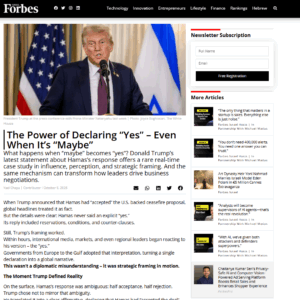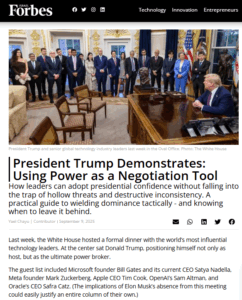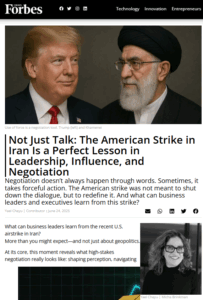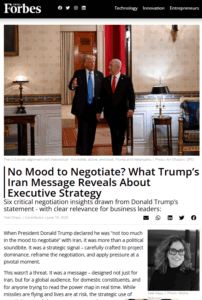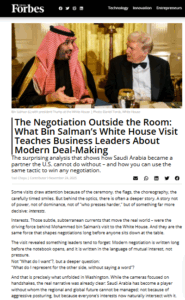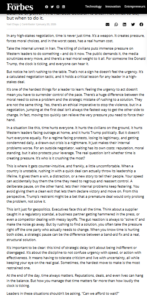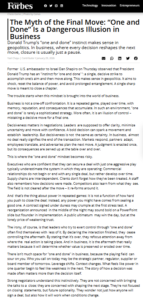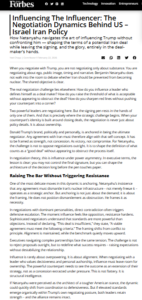Forbes
In “The Power of Declaring ‘Yes’ – Even When It’s ‘Maybe’,” Yael Chayu challenges conventional negotiation thinking by showing how confidently embracing ambiguity as a “yes” can shift the narrative and command momentum. She argues that in business and leadership, daring to move forward even without absolute certainty becomes a strategic advantage – one that transforms hesitation into opportunity and fosters progress when others stall.
Forbes
In the article “President Trump Demonstrates: Using Power as a Negotiation Tool,” Yael Chayu analyzes Donald Trump’s negotiation style — emphasizing how he leverages power dynamics, calculated inconsistency, and the ability to “walk away” to gain control and influence outcomes. She notes that while power can be an effective negotiation tool, overuse may harm credibility and trust. Chayu advises business leaders to adopt this tactic strategically: project confidence, withdraw from unfavorable deals, and maintain long-term professional relationships.
Forbes
In the article “Not Just Talk: The American Strike in Iran Is a Perfect Lesson in Leadership, Influence, and Negotiation,” Yael Chayu presents the U.S. airstrike as more than a military action — it serves as a powerful example of strategic leadership and negotiation. She explains how decisive action can redefine the rules of engagement, reshape perceptions, and force counterparts to reevaluate their stance. Chayu highlights that effective negotiation goes beyond dialogue; it requires understanding the other side’s mindset, using power with precision, and offering dignified solutions that enable all parties to reach an agreement without losing respect or authority.
Forbes
In the article “No Mood to Negotiate? What Trump’s Iran Message Reveals About Executive Strategy,” Yael Chayu argues that when Trump declared he was “not too much in the mood to negotiate,” he delivered more than a political statement — he sent a strategic signal. He used timing, tone, and context to project dominance, reframe the negotiation dynamics, and exert pressure without explicit threats. Chayu outlines how leaders can learn from this: by cultivating alliances, orchestrating the negotiation environment, signaling credibility, knowing when to adopt a “take-it-or-leave-it” stance, managing unpredictability, and treating crisis itself as part of the leverage framework.
Forbes
Mohammed bin Salman’s White House visit illustrates that modern deal-making is shaped less by pressure inside the negotiation room and more by aligning interests long before talks begin. The article emphasizes that effective leaders build partnerships by understanding each side’s strategic needs, creating mutual dependencies, and recognizing the personal motivations behind political or business decisions. True negotiation power today comes from crafting a shared vision that makes cooperation the rational choice – turning the formal meeting itself into a final, almost ceremonial step.
Forbes
The article argues that Israel-Lebanon talks are less about diplomacy and more about managing power and risk. While Hezbollah is not formally involved, it holds decisive leverage over outcomes. The negotiations cannot resolve core conflicts or disarm Hezbollah, but they may still reduce escalation by reshaping incentives and increasing the cost of confrontation.
Forbes
This article by Yael Chayu explores how strategic delay can be a powerful tool in high-stakes negotiations. Using the example of global political tensions, it explains why resisting the pressure to act quickly can preserve leverage and lead to stronger long-term outcomes. Chayu connects geopolitical strategy to executive decision-making, showing business leaders how managing timing – not just action – can determine whether a deal becomes a temporary fix or a real solution.
Forbes
This Forbes article by Yael Chayu challenges the idea that a single decisive move can truly end a negotiation in business. It argues that while a “one and done” mindset may work in geopolitics, business operates as an ongoing system shaped by relationships, reputation and long-term consequences. Chayu explains that effective leaders focus less on closing a moment and more on managing what follows, recognizing that real power lies in shaping the next stage of the game rather than declaring it finished.
Forbes
Yael Chayu wrote in her Forbes article that the evolving dynamics between the United States, Israel, and Iran demonstrate how modern negotiation extends far beyond formal talks and relies heavily on influence, signaling, and strategic positioning. The article concludes that in complex geopolitical conflicts, real leverage is often created through shaping perceptions, alliances, and expectations rather than direct confrontation, emphasizing that successful negotiation depends on understanding the opponent’s motivations, applying calculated pressure, and influencing decisions in ways that advance strategic goals while keeping future dialogue possible.

